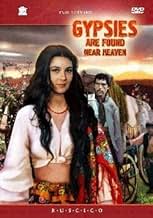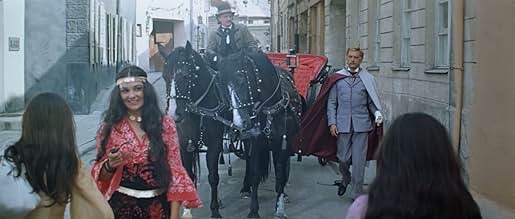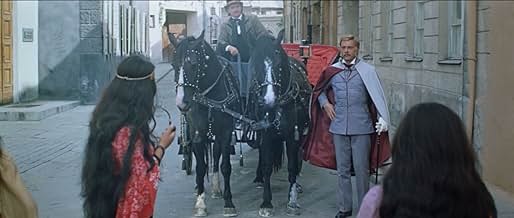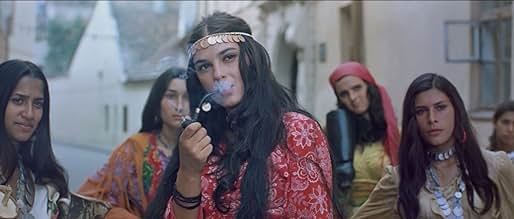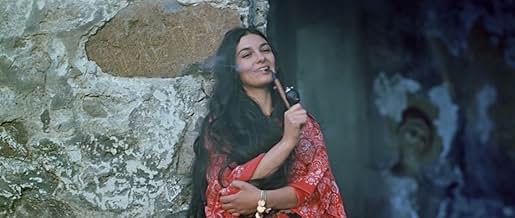IMDb-BEWERTUNG
7,3/10
1974
IHRE BEWERTUNG
Rada, ein schönes und sehr stolzes Zigeunermädchen, stiehlt die Herzen der Männer. Sie hat auch das Herz von Zobar, dem Pferdedieb, gestohlen und seinen Geist verzaubert. Er ist bereit, sein... Alles lesenRada, ein schönes und sehr stolzes Zigeunermädchen, stiehlt die Herzen der Männer. Sie hat auch das Herz von Zobar, dem Pferdedieb, gestohlen und seinen Geist verzaubert. Er ist bereit, seine Freiheit aufzugeben, aber nicht seinen Stolz.Rada, ein schönes und sehr stolzes Zigeunermädchen, stiehlt die Herzen der Männer. Sie hat auch das Herz von Zobar, dem Pferdedieb, gestohlen und seinen Geist verzaubert. Er ist bereit, seine Freiheit aufzugeben, aber nicht seinen Stolz.
- Regie
- Drehbuch
- Hauptbesetzung
- Auszeichnungen
- 1 Gewinn & 1 Nominierung insgesamt
Grigore Grigoriu
- Loiko Zobar
- (as Grigori Grigoriu)
Barasbi Mulayev
- Makar Chudra
- (as B. Mulayev)
Borislav Brondukov
- Bucha
- (as Boryslav Brondukov)
Vasyl Symchych
- Balint
- (as Vasili Simchich)
Empfohlene Bewertungen
A poem about freedom and love. A strange world of joy, ambitions and desires. A form of escape and a colorful dream.
Emil Loteanu was a special director for the way chosen. His movies, products of Sovietic cinema, are, very often, touching skits of a raw cardboard's space. The stake- to prove the identity of a small nation in a empire. The means- Russian art of purlieus. Accent on the dramatic themes and emotions like only message.
"Tabor ukhodit v nebo" is only a picturesque film about a imaginary community. His importance is not small because the Gipsys are the product, in the self-image ,of this movie, slice of a possible golden age at the beginning of XXth century. In same time, it is a good introduction to Kusturica filmography, with the aspects of a ambiguous Balkan's life, with songs and carousals with barbarian persistent taste, with full of color atmosphere and any way of business.
So, a good film for Bovaric public, for the Kakania's nostalgics, for amateurs of subtle kitsch, for the fans of actors, for old Gipsys or dreamers. But, in fact,it is only a ethnographic foray in Maxim Gorki's pathetic universe. Eastern Europe- like a strange endless Gypsy's song.
Emil Loteanu was a special director for the way chosen. His movies, products of Sovietic cinema, are, very often, touching skits of a raw cardboard's space. The stake- to prove the identity of a small nation in a empire. The means- Russian art of purlieus. Accent on the dramatic themes and emotions like only message.
"Tabor ukhodit v nebo" is only a picturesque film about a imaginary community. His importance is not small because the Gipsys are the product, in the self-image ,of this movie, slice of a possible golden age at the beginning of XXth century. In same time, it is a good introduction to Kusturica filmography, with the aspects of a ambiguous Balkan's life, with songs and carousals with barbarian persistent taste, with full of color atmosphere and any way of business.
So, a good film for Bovaric public, for the Kakania's nostalgics, for amateurs of subtle kitsch, for the fans of actors, for old Gipsys or dreamers. But, in fact,it is only a ethnographic foray in Maxim Gorki's pathetic universe. Eastern Europe- like a strange endless Gypsy's song.
beautiful songs, beautiful story. inspired performances. wise manner to present/remember old traditions and a page of gypsy's past who could be seeds for the present problems. sweet, romantic, remembering pages from Russian classic literature, it is a beautiful film, mixture of magic, love, faith and rules who seduce and impress, first form of Bregovic's universe and soap opera. it reflects the circle 's pieces of a community and have a cut couple as lead characters. and not the story remains after its end in memory but the music. old songs, fascinating dances, strange forms of courage, freedom in different definition, the dangerous games, the high price of honor, the love in its large forms. a film who could have many sides. because it is an ethnographic trip, a dark fairy tale, a romantic story, a film with a generous message, an aesthetic delight.
This movie is a sweet melodrama about the life and the customs of gypsies in the past century. One of the main aspects that one may consider before watching this movie is the soundtrack, which contains several gypsy songs (original, with Romany words) flavored with some masterpieces of the well known Moldavian soundtrack composer Eugen Doga.
Unlike other movies, this film marches deep into the past revealing a world completely unknown to most of the present day individuals, an almost ancient time when gypsies were just a tribe of ill-behaved, rebellious people wandering from one place to another. Everything is covered with a haze of magic and archaic. It was a time when killing and getting killed for a fistful of gold or a horse were the order of the day, when people believed in sorcery and magic. It was a time when the traditions perpetuated orally, when "a capella" singing (rarely aided by a background violin or guitar) rather than big-band Bregovic-like events was the way to express one's grief or happiness. Listen to "I am dying mother" or "Phabaj" to understand what I mean!
Essentially the script tells an uncommon and passionately love story between a horse thief, Zobar, and a young gypsy witch, Rada. The script is a little bit unpolished making the impression of a "pink novel", but the music and the images (not to mention the beauty & talent of Svetlana Toma) balance quite well the not so very thick plot.
9/10 - for picturing so well a world lost to the ravages of time.
Unlike other movies, this film marches deep into the past revealing a world completely unknown to most of the present day individuals, an almost ancient time when gypsies were just a tribe of ill-behaved, rebellious people wandering from one place to another. Everything is covered with a haze of magic and archaic. It was a time when killing and getting killed for a fistful of gold or a horse were the order of the day, when people believed in sorcery and magic. It was a time when the traditions perpetuated orally, when "a capella" singing (rarely aided by a background violin or guitar) rather than big-band Bregovic-like events was the way to express one's grief or happiness. Listen to "I am dying mother" or "Phabaj" to understand what I mean!
Essentially the script tells an uncommon and passionately love story between a horse thief, Zobar, and a young gypsy witch, Rada. The script is a little bit unpolished making the impression of a "pink novel", but the music and the images (not to mention the beauty & talent of Svetlana Toma) balance quite well the not so very thick plot.
9/10 - for picturing so well a world lost to the ravages of time.
This film, known as "Satra" - a group of wandering gypsies - to the Romanians is definitely worth viewing. Based on a short novel by Gorki, it gives a snapshot of Gypsy life in the Far-Eastern part of the Habsburg Empire. Nevertheless, the film is a bit diminished by its 1970s-Soviet origin: many badly played-back songs, a soundtrack that tends to give a hippy-70s flavors to the Gypsy songs. I'm not so enthusiastic about the work of the composer who rather spoiled the Gypsy music than improved it. In this domain, Goran Bregovici keeps the lead. The RUSCICO DVD edition includes some interesting bonus though not very enlightening. Notice that the script was refused by the Moldovan Film Studios so that it was shot by the Moscow film studios.
Moldovan director Emil Loteanu's tenth feature film is probably his most famous one. "Gypsies Are Found Near Heaven" (1976) was a huge hit in the USSR, the most watched film in cinemas that year and also something that the critics fancied. The film, based on two stories by Maxim Gorki, is a depiction of wandering Gypsies in the turn-of-the-century Austria-Hungary. These people travel from one place to the next without staying long. They dance, they sing, and they fall in love.
Loteanu's film is very colorful and kind of other-worldly in its depiction of history. Though it is supposed to be taking place in 1900 or something, the gypsies at times look like 1970's hippies, and the look of the film is a tad anachronistic. It is not a narrative-driven film, but instead focuses on the atmosphere. There is a lot of gypsy music in it, which was historically interesting, and many of the songs were a joy to listen to. As a depiction of a disappearing way of life, this film works well. As a well-thought-out artistic experience, it's pretty messy. Some will like it more than others.
Loteanu's film is very colorful and kind of other-worldly in its depiction of history. Though it is supposed to be taking place in 1900 or something, the gypsies at times look like 1970's hippies, and the look of the film is a tad anachronistic. It is not a narrative-driven film, but instead focuses on the atmosphere. There is a lot of gypsy music in it, which was historically interesting, and many of the songs were a joy to listen to. As a depiction of a disappearing way of life, this film works well. As a well-thought-out artistic experience, it's pretty messy. Some will like it more than others.
Wusstest du schon
- VerbindungenFeatured in Legendy mirovogo kino: Emil Loteanu
- SoundtracksNane Tsokha
Performed by Alyona Buzylyova
Top-Auswahl
Melde dich zum Bewerten an und greife auf die Watchlist für personalisierte Empfehlungen zu.
- How long is Queen of the Gypsies?Powered by Alexa
Details
- Laufzeit1 Stunde 41 Minuten
- Farbe
- Seitenverhältnis
- 2.20 : 1
Zu dieser Seite beitragen
Bearbeitung vorschlagen oder fehlenden Inhalt hinzufügen


